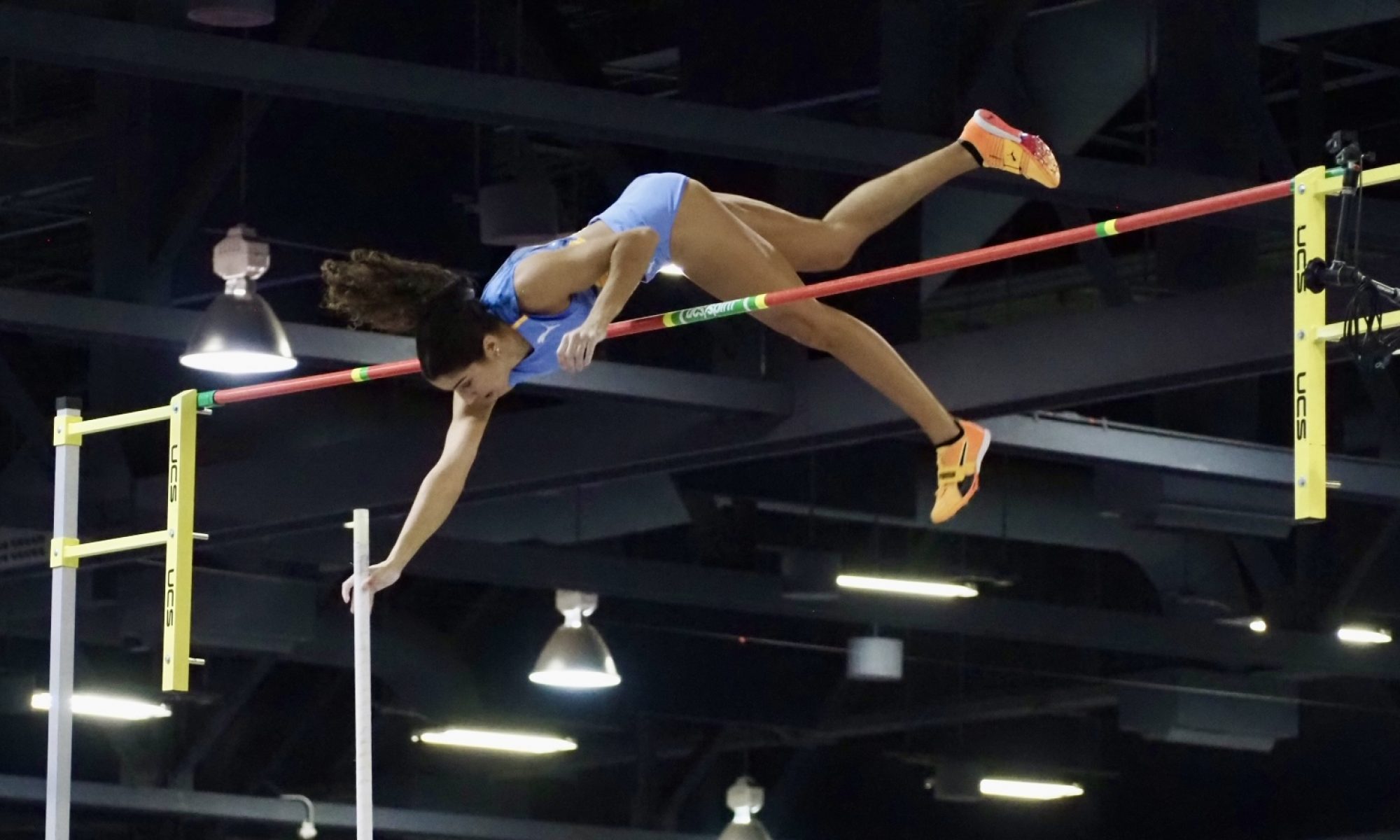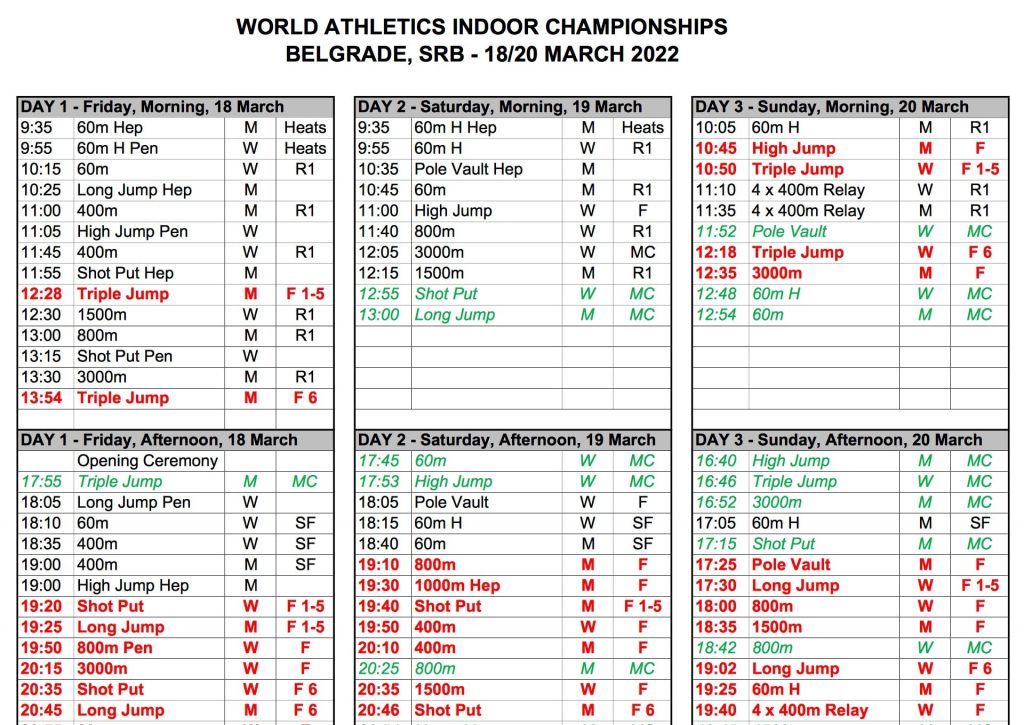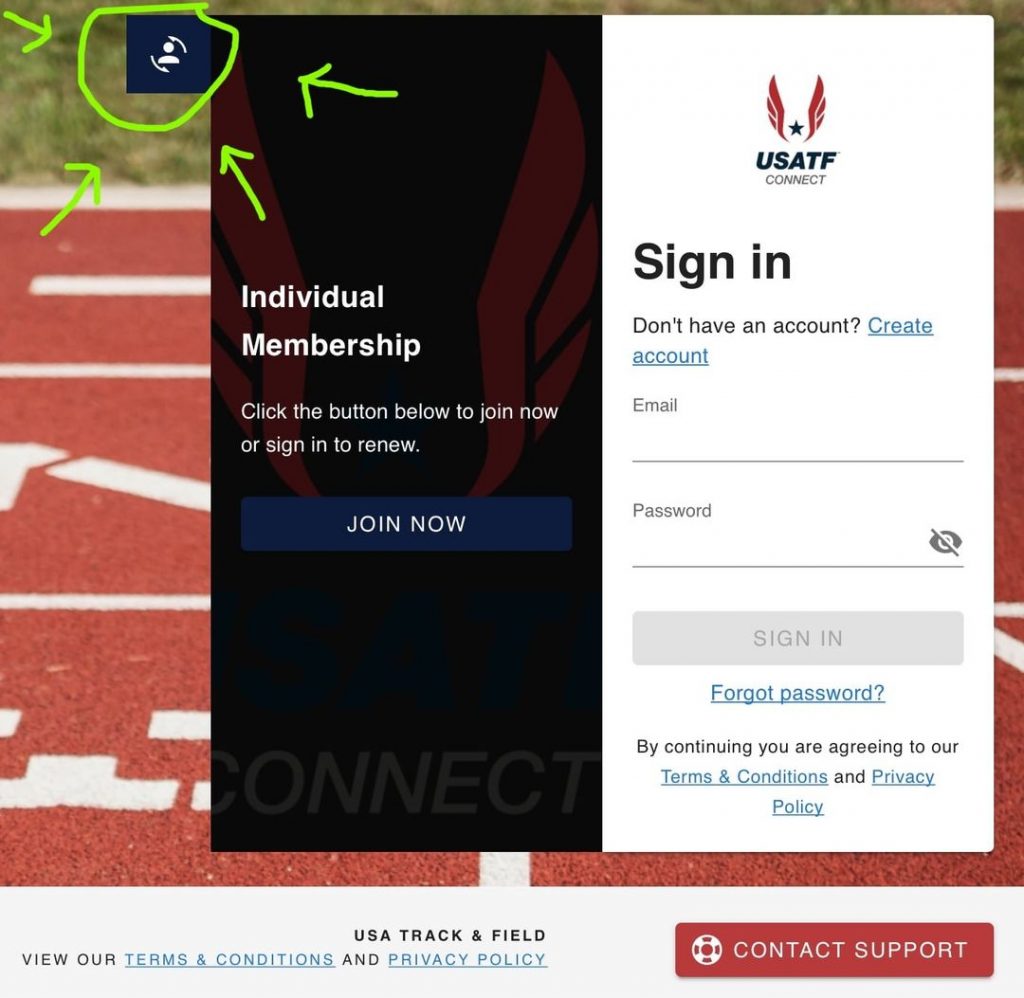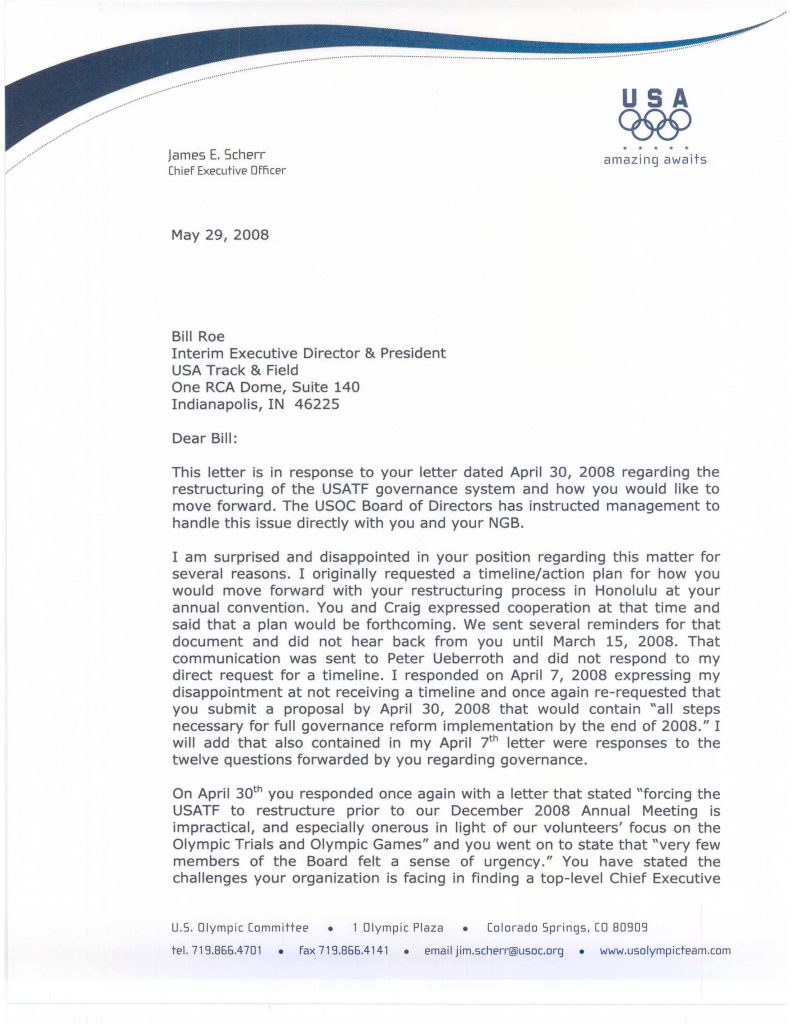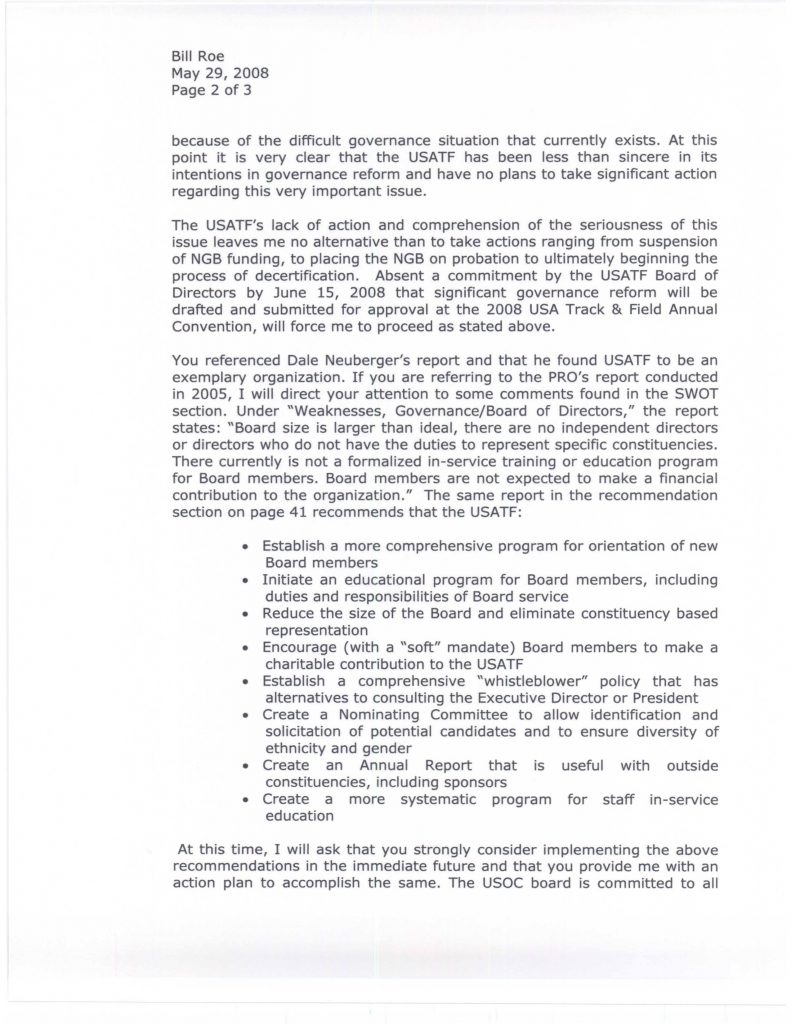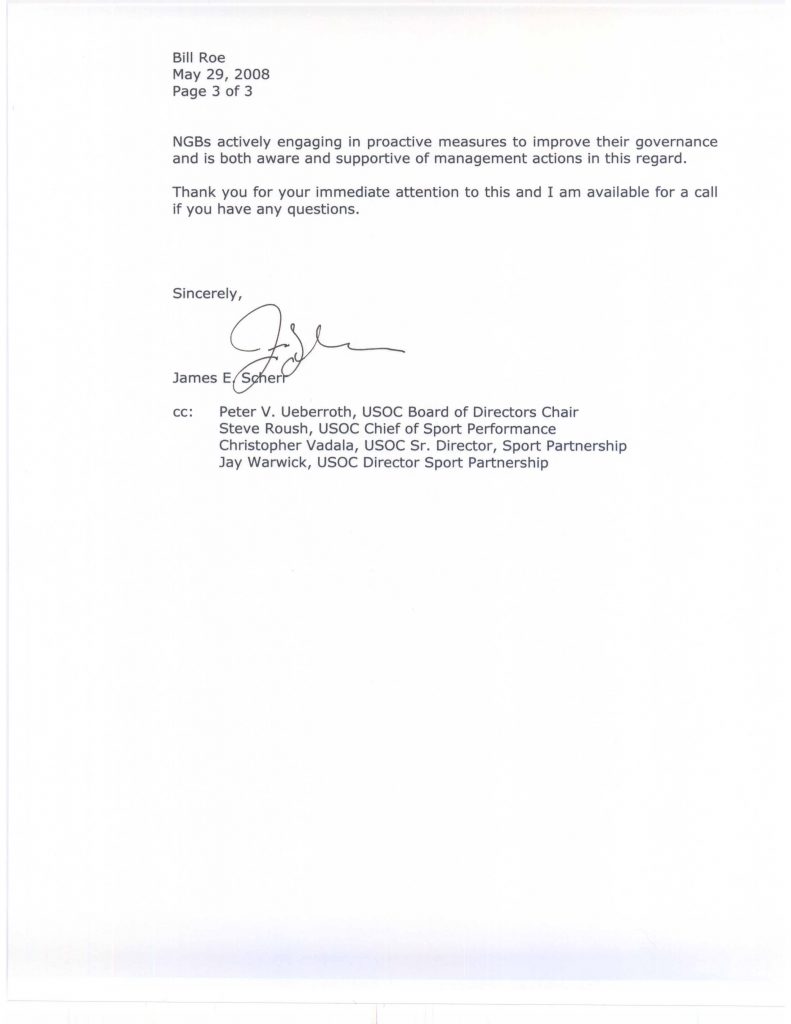This is a repost of an article originally published November 30, 2020 by Track and Field News. Original link.
Becca Peter is the founder of Pole Vault Power.
On December 6th, 2020, USATF Membership Should Vote Against Giving Up Our Voice in Governance
The closing session of the 2020 USA Track & Field Annual Meeting will be held virtually where roughly 1,000 voting delegates will be faced with the decision to give up our voice in governance or risk decertification from the USOPC.
The USOPC has ordered USATF to eliminate the power our delegates currently have to make changes to our governance manual, or face decertification. I am urging our delegates to vote no on this legislation; our membership needs to retain its voice in governance.
To our credit, USATF’s governance structure has a strong system of checks and balances that keeps any one person from taking control of the organization. We are fairly unique among NGBs in this regard.
One of the many benefits our governance model provides is athlete empowerment. We all know it isn’t perfect, but our athletes have always been more empowered than their peers in other NGBs, and, while still not fully realized, the athlete’s voice has continued to strengthen over time.
Unfortunately, the USOPC does not like this model; it has actively been trying to dismantle this governance for years now. Why? Empowered athletes have a seat at the table, and they are harder to financially exploit.
In early 2020, the USOPC’s informal requests turned into demands and threats. It is now ordering USATF to eliminate the delegates’ ability to make changes to USATF’s governance manual.
While it is important for us to be working in partnership with the USOPC, this demand of theirs has crossed the line. This is not what is in the best interest of our athletes and our sport.
The USOPC’s demand comes with a threat of “decertification.” In the past, decertification was only threatened when the NGB committed a serious infraction of the Ted Stevens Amateur Sports Act. Now the USOPC says they are prepared to begin proceedings to decertify USATF as an NGB if the delegates do not approve their demands to relinquish our voice.
We cannot vote for legislation that creates an imbalance of power that hurts our sport. It may be terrifying to stand up to a bully… especially when that bully has the ability to inflict serious harm. But if we work collaboratively, we will prevail.
After consulting with several experts, I do not think that the threat is real. Congress just enacted the “Empowering Olympians, Paralympians and Amateur Sports Act of 2020” specifically to prevent a small group of people from hijacking an NGB for their own purposes, and to run away with the money.
The choice of the words “Empowering Olympians” is not accidental, the statute is designed to shift power to athletes and give them a voice in governance. But here comes the USOPC trying to take away ours. Congress is watching the Olympic Movement and how it is treating athletes, in issues big and small; everything from health insurance, athlete mental health, Rule 50 and the ability to protest, Rule 40 and the ability for athletes to use the marks to generate revenue, to pregnancy discrimination. Congress will see this effort for what it is, a power grab away from athletes.
The time has come for the delegates to take a stand this Sunday. If we give in to the USOPC’s bullying now, it will make it difficult to undo this power grab at a later date.
The USOPC is not in a good political position to attempt to decertify us in 2021, and it would be morally wrong for us to give in to their demand that we hand over all power to the board.
1. The Backstory: The USOPC Has Been Trying to Control Our NGB for Decades.
The USOPC has a long history of trying to control USATF through threats of decertification.
In the early 2000s, the USOPC felt that USATF’s Board of Directors was too large. USATF did not contract their board quickly enough for the USOPC’s liking and they threatened to decertify us in order to speed up the process.
Again in 2014, the USOPC tried to require USATF to separate the position of the Board Chair from the President. USATF elects its President by a direct vote of all delegates, and this person generally serves as the Board Chair. The USOPC did not like USATF’s direct-election; it gave the delegates a measure of power, making it much harder for the USOPC to control the NGB. USATF did make changes to their bylaws in response to the USOPC’s concerns, but the President can still serve as the Board Chair and the USOPC remains unhappy with this attempt to compromise.
Now in 2020, the USOPC has told USATF, for the very first time, that USATF must eliminate the delegates having the final approval over changes to the organization’s bylaws, and that the USOPC will decertify USATF if they do not immediately make this change.
2. USATF Is Not Out of Compliance With Any Aspect of the Sports Act or the USOPC Bylaws.
In correspondence with the USOPC, they have asserted to USATF that removing delegate-power is required and mandatory.
But a prohibition on delegate voting power is not included in the new statute, the 1978 Ted Stevens Olympic and Amateur Sports Act, anywhere on the USOPC’s website, USOPC bylaws or the USOPC NGB Audit Standards. Just the opposite; the new Empowering Olympians Act requires athletes to have more voting power, not less.
You can download USATF’s most recent compliance checklist here.
The USOPC’s 2019 review of USATF says we were fully compliant, and there was no mention of concern about our legislative process. In fact, our governance is in compliance with every standard the USOPC has published.
Instead of compliance, think of “power grab.” The USOPC is creating more “solutions” in order to exert more power over us as an NGB. Given that USATF is one of the more athlete-centric NGBs, with athletes already having power to influence our NGB’s policy decisions, these demands seem to contradict the USOPC’s mission to become service-driven and athlete-first. Removing the power of our delegates to vote would give athletes less power, not more.
3. The USOPC Is About to Be Overseen by Congress and a New Comptroller Position.
In October, President Trump signed the “Empowering Olympic, Paralympic, and Amateur Athletes Act of 2020” into law.
As its name suggests, the new federal law is designed to shift power to athletes, with more independent oversight by Congress and by a Comptroller. The statute also creates a 16-person Commission to re-evaluate the Olympic Movement, including the Sports Act.
The USOPC is desperately trying to get us “properly” under their thumb before Congress steps in and starts cleaning house.
Congress does not have issues with USA Track and Field, the organization that, while not perfect, nonetheless has a long history of empowering and protecting athletes. Congress has issues with the USOPC because of their failures to protect athletes, failures that lead to preventable athlete abuse.
4. The Term “Good Governance” Is Meaningless Coming from the USOPC.
The USOPC keeps repeating the phrase “good governance” when it wants us to change something we are doing.
You will likely be hearing soon about the Daniels Report that USATF commissioned to improve our SafeSport efforts. One of the recommendations made by Deborah Daniels is that the board have the ultimate authority over our sport’s bylaws.
I spoke with lawyer Nancy Hogshead-Makar of Champion Women, who helped author the Empowering Olympians Act as Co-Chair of Team Integrity and USOPU, the largest group of Olympic Movement members ever assembled, and she strongly disagreed with this concept. While the recommendation of “100% Board Control” may be appropriate for issues like NGBs prohibiting coaches from having sexual relationships with the athletes they coach, “100% Board Control” is not appropriate as a blanket rule. Indeed, concentrated board control is how Scott Blackmun was able to twist the USOPC into a “money and medals” machine, leaving athletes poor, voiceless and compliant.
Nancy is the co-Chair of Team Integrity, their goal is to have 50% of board seats represent athlete-interests. She explained that athlete-interests should be formally represented in governance. The power within an NGB should be balanced instead of being entirely controlled and concentrated by sales and marketing employees at the NGB or the USOPC. You can read about their recommendations here.
Other people point to best practices for non-profits. But we are not just any non-profit. We are the only path for an athlete to the Olympics, giving our NGB and the USOPC monopoly-power over the fate of athletes. It is this power over athletes that makes them powerless and necessarily obedient; a dangerous position for athletes to be in. All proposed governance models should recognize this reality and should ward against athlete abuse. https://img1.wsimg.com/blobby/go/573edb75-6173-4bec-8d91-9972c89dc2cd/downloads/USOC%20Financial%20Reforms%20Report.%20Committee%20to%20Re.pdf
USATF does not just raise money and post videos of athletes’ performances on social media. We govern the entire sport, including athletes; we make decisions that impact their destiny. Those who are governed deserve to have meaningful input as to how they are governed.
5. A Weakened Athlete Voice in Governance Runs Contrary to Every Recommendation Coming Out of the Nassar Investigations.
All four major reports coming out of the Nassar debacle concluded that intentional athlete-powerlessness within the governance systems of the Olympic Movement made athletes unreasonably vulnerable to abuse. Athletes currently have a right to 20% of the votes at USATF’s closing session, which works out to roughly 200 athlete votes through the allotment to AAC, and with the new statute that passed we will have to raise this to 33%.
As our power structure currently stands, athletes have the ability to have even more votes than this, because each Association’s delegation is supposed to include athletes (with a broader definition of the word “athlete”).
If the USOPC forces USATF to eliminate the direct vote of our delegates at closing session, this means the athletes will be entirely dependent on their representatives at the board level for meaningful representation. We’ve seen how easy it is for the USOPC to co-opt this small number of athletes.
Athletes are far easier to “manage” if the USOPC only has to deal with a handful of athletes on USATF’s board, and not the hundreds of rank and file athletes who are active within our AAC. In other words, athletes have the most power when their power is not limited to the handful of athletes on the board, but also includes the hundreds of athletes with the ability to vote on meaningful issues.
Membership power also takes the pressure off the small number of athletes that sit on the board. We know that the USOPC and NGBs can reward athletes who support what the sales and marketing staffers want, and they can retaliate if the athletes stand up for the interests of their constituents. Athlete board members must know that they can have the support of the membership supporting their athlete-centric stands.
6. The USOPC Is Afraid of Healthy Conflict That Is Inherent in Our Membership Governances.
USATF’s system of checks and balances leads to a lot of discourse, which the USOPC considers a bad thing. But having passionate arguments within an NGB about issues such as the best ways to direct resources, the best places to have your national championships and the best ways to adapt governance to a rapidly changing world, is HEALTHY for an NGB.
When the power in a sport is concentrated in the hands of the few at the top, and any dissent is removed, the athletes are ultimately who suffers the most, whether it is due to being abused by a coach or financially exploited by the Olympic movement. It is the athletes who keep their sports alive, but in many sports, they are treated as a disposable commodity and kicked to the curb if they speak up.
The USOPC wants to slap a SafeSport bumper sticker on the Olympic movement and move on with life. But even if SafeSport was working (it isn’t), it does not address the financial exploitation of the athletes.
7. On Sunday at 10am, I Urge You To Vote Against Giving Up the Athlete Voice In USATF Governance.
This change to USATF’s bylaws is a solution in search of a problem.
All voting delegates need to attend the closing session of the USATF Annual Meeting on Sunday, December 6, at 10am ET.
This issue will be brought to the floor. Each side will have 15 minutes to present their case, then a vote will be taken.
I urge all voting delegates to vote “no” on the legislation that gives the board of directors the ultimate authority over USATF’s bylaws.
